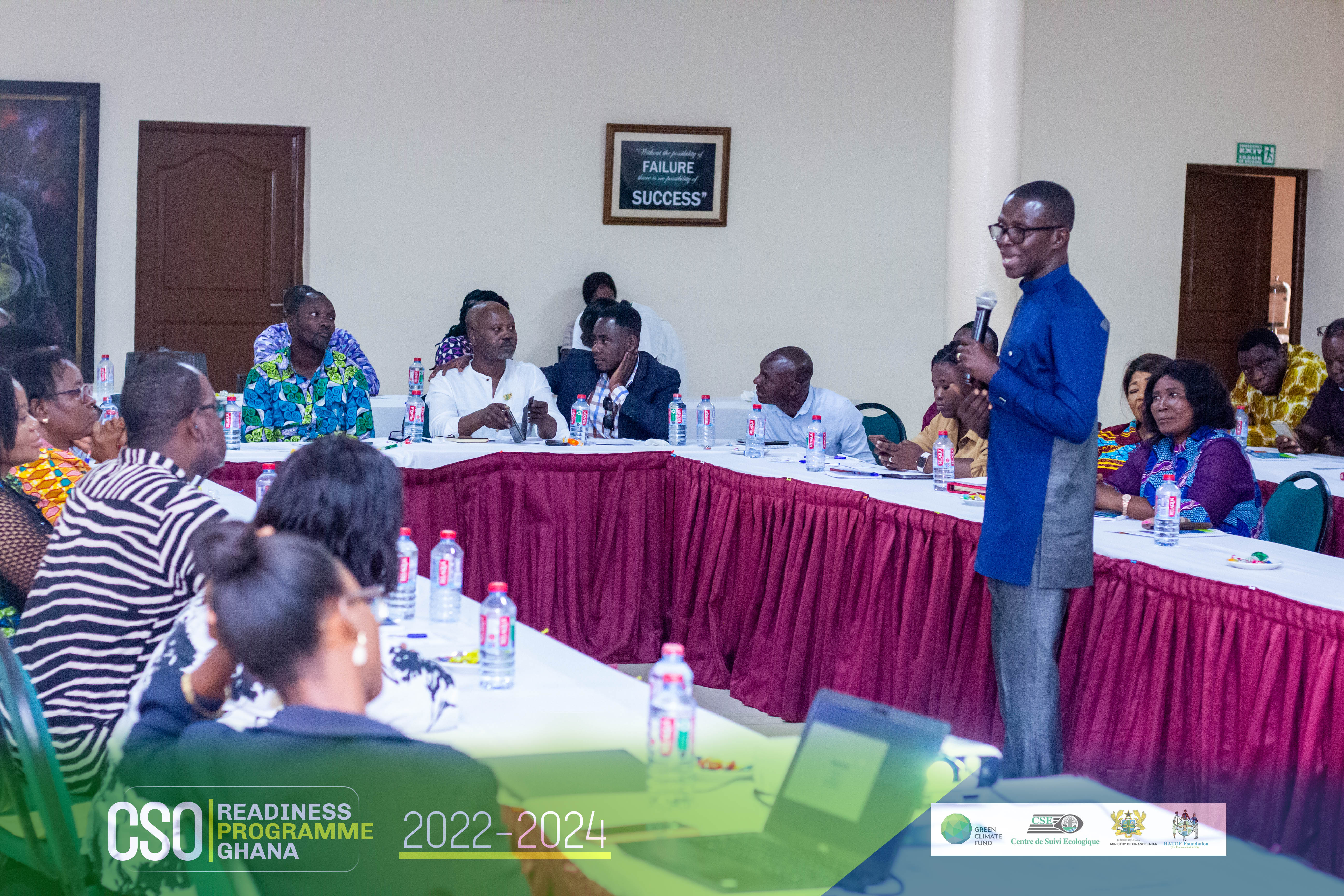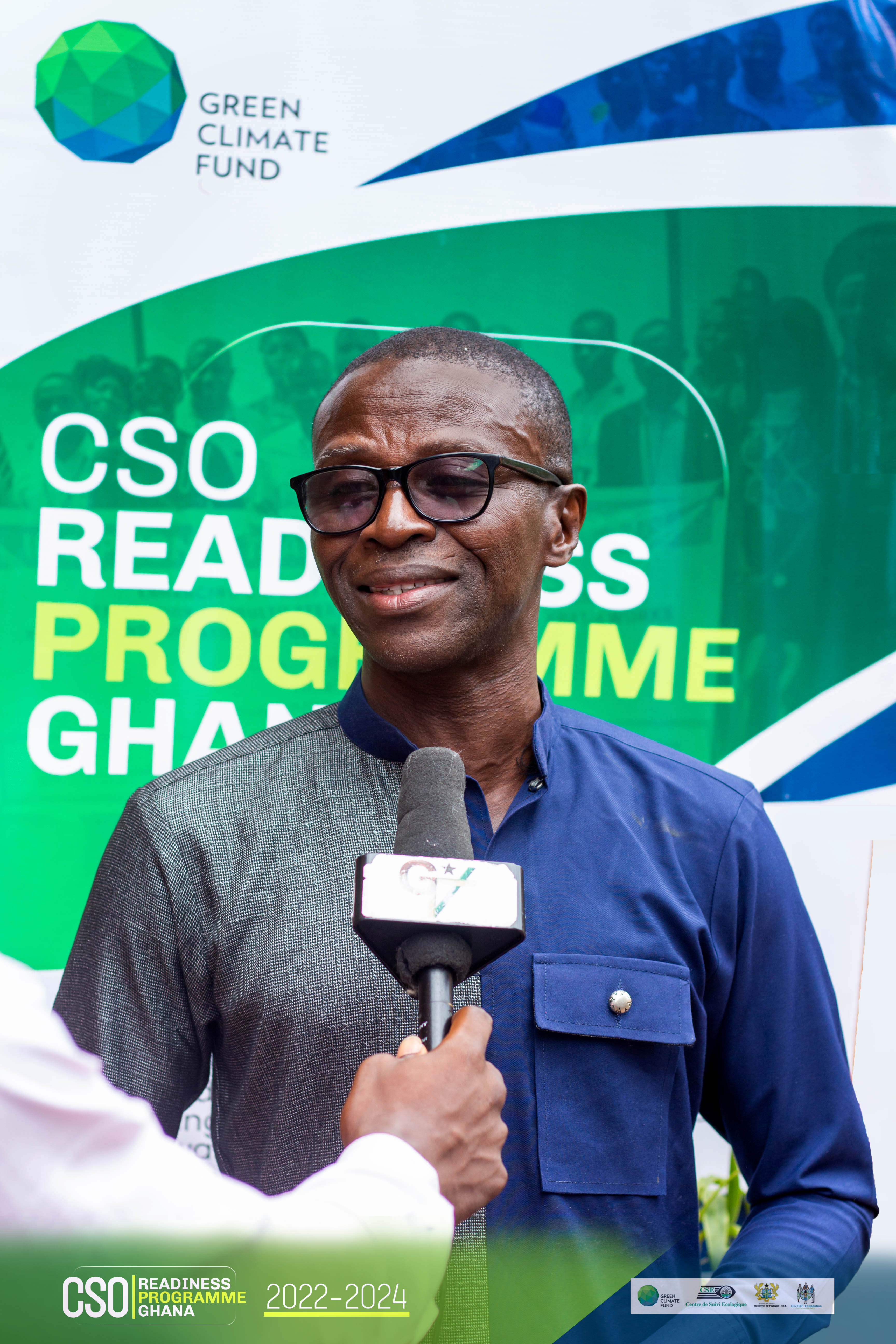Network Information
| Coalition | Representative Name | Gender | Contact |
|---|
| Nominated Institution | Head | Telephone |
|---|

Capacity Building and Knowledge Management on Climate Change for Civil Society Organizations (CSOs) in Ghana towards the implementation of the Nationally Determined Contributions.
Capacity Building and Knowledge Management on Climate Change for Civil Society Organizations (CSOs) in Ghana towards the implementation of the Nationally Determined Contributions.
Green Climate Fund (GCF)

May 2022 – May 2025

Ghana

Direct: 40 Ghanaian CSOs (4 from each of the 10 CSO Networks)
engaged in implementing the Rio conventions
Indirect: Over 200 CSOs in Ghana
For the past 15 years, the government of Ghana has received support from the Global Environment Facility (GEF), The Adaptation Fund, and other multilateral and bilateral agencies, as well as non-state actors, to implement several capacity-building and climate change coordination and policy development initiatives. About thirteen climate change-related capacity-building projects have been implemented under the GEF country allocation.
Further to these supports, the country has received four readiness support (GHA-RS-001, GHA-RS-002, GHA-RS-003, and GHA-RS-004) from the Green Climate Fund. Nonetheless, these readiness supports have engaged mainly the government and state actors, almost neglecting other key stakeholders, such as Civil Society Organizations (CSOs), in their planning, design, and implementation.

CSO stakeholders discussing climate initiatives
The government cannot address climate change issues alone; cooperation with NGOs and civil society is paramount. Civil Society Organizations, including NGOs, are important sources of information and technical expertise on various issues, including climate change.
However, there is a significant gap in knowledge and capacity constraints among CSOs for effectively carrying out the above potential roles to contribute to the country's sustainable development. Capacity gap analysis among CSOs and CSO Networks in Ghana has revealed wide gaps in technical skills and institutional capacity to respond effectively, integrate climate change adaptation and mitigation into relevant existing and future programmes and projects, and catalyze climate change solutions in Ghana.
To strengthen the capacities of 10 Ghanaian CSO networks to contribute efficiently to the Nationally Determined Contributions planning and implementation processes by:
Engaging the National Designated Authority, Direct Access Entities, and GCF on project design, selection, budget preparation, implementation, monitoring and evaluation
Developing a CSO-tailored training module on preparing funding proposals to leverage nonstate actors' engagement with the GCF
Developing a five-year Civil Society Climate Change Agenda and Action Plan
Developing GCF Concept note proposing how this initiative could be up-scaled nationally to facilitate agreement on direction and access to financing
Successfully launched the project and conducted inception workshop with key stakeholders.
Project Launch ReportMapped and identified relevant stakeholders, assessed their capacity needs, and clarified their roles and responsibilities in connection with GCF's related issues at the national level, including the Country Program.
Validated the findings of the gap assessment performed with stakeholders.
Validation Workshop Report
Capacity building workshop with CSO representatives
Conducted training for relevant stakeholders on findings of gap assessments and climate risks identified to complement ongoing national and sub-national level engagements.
Designed a suitable coordination mechanism and consultative process for CSOs, linked with a national coordination mechanism for an enhanced CSO engagement.
Organized a workshop to validate the CSO's coordination mechanism and consultative process and build the capacity of the members of the coordination mechanism.
Took stock of funding needs assessments, projected climate risks, vulnerabilities, and opportunities to processes streamline planning.
Organized a two-day workshop for relevant stakeholders on climate risks and opportunities and mainstream them into climate action at the country level.

Strategic planning session for the five-year Climate Change Agenda
Developed a Civil Society Climate Change Agenda and Action Plan to guide future CSO engagement.
Developed communication tools, such as a communication plan, semester-based e-bulletin in local language and English, and semester-based newsletter in English, and disseminated through different communication channels.
Organized eight-day residential training workshops on GCF and climate change-related issues, policies, project development, implementation, and monitoring.
CSOs and relevant stakeholders identified, and their needs assessed to streamline training.
Ghana Environmental CSO Coordination Mechanism (EnVOG) established to ensure CSOs are engaged on climate-related issues, including NDC and GCF-related matters at the country level.
CSOs have improved their capacity to develop high-quality concept notes and effectively implement GCF-funded activities.
Stakeholders used available information about the climate risks and opportunities in their planning and climate actions.
Developed communication strategy to enhance awareness of climate hazards and knowledge about how to manage them.
One concept note guided by the CSO Agenda and Action Plan prepared and aligned with the country's NDC, climate change plans, and strategies.

CSO members implementing climate action strategies
Over 100 CSOs in Ghana engaged in the Rio Convention implementation were identified, and their capacity needs on climate change and climate finance were assessed.
Established the Ghana Environmental CSO Coordination Mechanism (EnVOG) as the environmental voice of Ghana.
40 CSOs trained on climate change project development, implementation, monitoring, and evaluation in line with GCF's requirements.
Prepared and disseminated a stocktaking report comprising impact and projected climate risks, vulnerability, opportunities, funding needs, and funding sources for CSOs in Ghana.
CSOs trained on GCF and climate change-related issues and policies
CSOs trained on climate risks and opportunities
Year strategic Civil Society Climate Change Agenda and Action Plan (2025-2030) developed
High-quality concept note developed to upscale project implementation